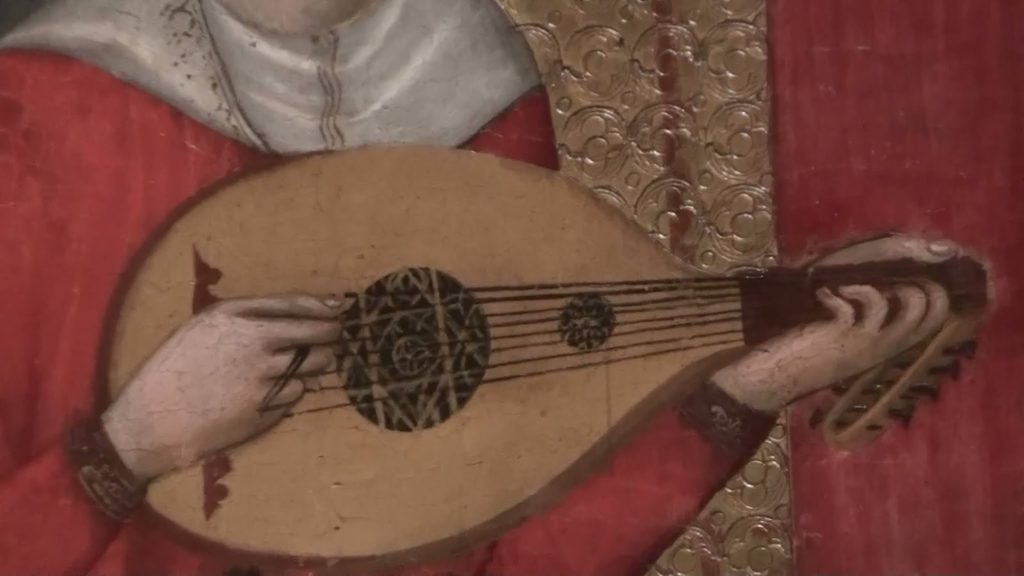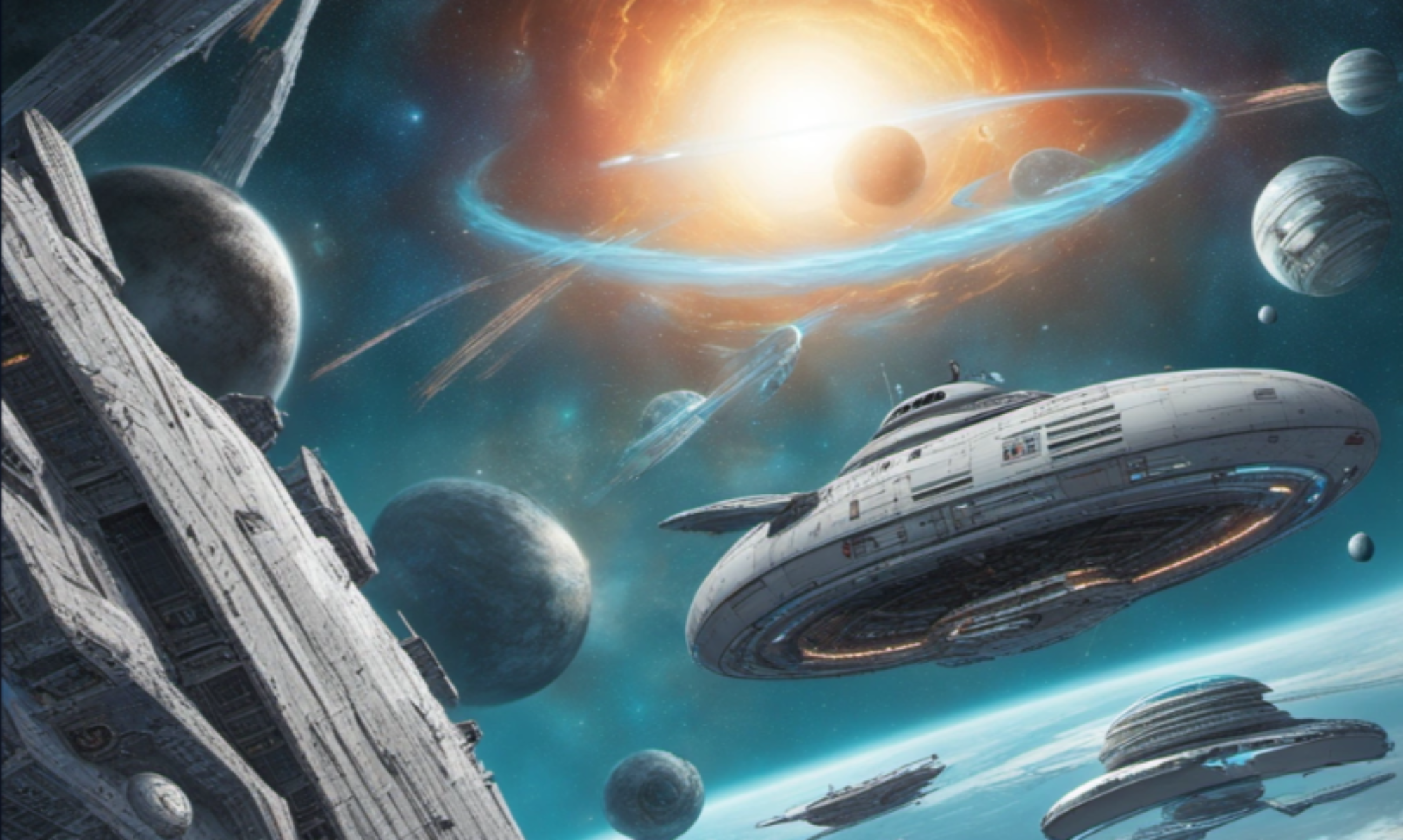As with all peaceful protests, the act of protesting eventually becomes tiring, with the endless chanting of “What do we want? Stop the whatever it is! When do we want it? Now!” Arms tire of holding placards. Either violence ensues or tents are raised, sleeping bags procured and nearby fountains used as toilets. The protest may even acquire official status.
But the Zorgons were far from hunkering down. They were getting restless. A female pulled out a lute-like instrument, strung with the spines of a coctus. She began strumming simple, elegant chords. Another retrieved a small earthenware drum, accenting every offbeat. Other Zorgons joined in by stamping, kicking up dust and scattering pebbles.
Nexus and Plexus barked robotically, rather appropriately for robots. As the drumming intensified, the robodogs succumbed to the beat of the music, hypnotically barking in time. One Zorgon placed a wooden tube in between his antlers. This was no wind instrument. Perhaps he had antler-sense, because a wave-like melody soared forward over the rhythmic texture of the rest of the tapestry.
Gaston Dimble was, of course, recording: “Not unlike the soft tones of a Sirian nocturne, except louder, the main melodic line is surprisingly robust. The stamping serves to strengthen the bonds of the clan and reassert ownership of the soil.”
Actually, they were really stamping because there were not enough clay drums to go around.
Dimble looked through the eyes of an anthropologist with a smattering of music theory. He watched Zorgons young and old dance to the music, he saw robodogs shudder, and up above the scientists peered down in curiosity and consternation. They were clearly mesmerised by the dancing and stomping, although they couldn’t possibly hear the music behind their polycarbonate windows. One of them even nodded his head back and forth as if he was at a silent disco, until a colleague frowned and jabbed him in the ribs.
Dimble switched to documentary mode: “The swaying of the Zorgons seduces in its unity, symbolic of solidarity, preceding the trance-like state induced as part of the ritual of music making, the universal language.”
Actually the swaying was due to fermented coctus juice, passed around twenty minutes ago. This wasn’t as powerful as clictus juice. Coctus juice was pretty much the Zorgon equivalent to goon, an ancient Australian drink beloved by first year college students..
The Professor took a sip. He was by no means a musical dunce. He played the Sirian gawdle, a cross between a cello and a bassoon. All these instruments, rhythms, and chants fascinated him. He joined in the stamping. The Zorgon next to him offered him a fermented coctus draught. He declined – he’d had enough already, and knew the effect was delayed. Five minutes later it hit him. His tongue felt as dry as a bone.
The stomping became more intense. Nexus and Plexus rose off the ground with each stamp. They were more than alarmed: their single eyes twitched in their sockets, popping in and out like yo-yos.
The melody was a river creating a course through an endless landscape.
Dimble pointed the flablet to where he thought the melody was flowing: towards the tower, as if willing the scientists to abandon their labs and enjoy the freedom of abandonment.
When the Zorgon pointed the instrument at the building, Dimble thought he perceived a faint rippling on the glass.
The compound glass was far too strong to break, but one of the scientists also noticed the ripple. Puzzled, he touched the window, then quickly drew back, rubbing and sucking his finger.
The tempo increased, the beat thickened. Dimble compared it to Stravinsky, a pre-technology composer, famous for the controversial Rite of Spring. At its first performance, the audience felt imbued with superhuman strength and also aggression.
The Rite of Spring stimulated Dimble’s interest in 20th century music. He taught himself to conduct by waving his arms in the kitchen with a zucchini. He even tried composing, uploading a rhythmical concoction of pots and pans to PipeLine under the pseudonym Giuseppe Zucchini.

With the relentless stamping percussion and accompanying melody now possessing every fibre of his body, the Professor imagined himself at the centre of an orchestra. He waved his right arm in the air at the strings, urging them to pluck a fierce accompaniment. He directed the timpanist to strike with exploding fists. Pointing his index finger at the woodwinds, he ordered them to produce disciplined staccato attacks. He singled out a lone oboe and with his left hand raised it above all others like a balloon on a string.
He saw that a small space had opened around him. The Zorgons had not stopped playing, but some pointed their instruments in his direction, glancing at him now and then as if for direction.
A little uncertainly, he raised his left hand, palm upwards. The music became louder. He repeated the action with more command and the music became considerably stronger. Lowering his hand, he softened the din. He waved with greater vigour and the beat quickened. His heart swelled.
If he drew his hands together the Zorgon orchestra responded as one. He could also control the foot-stompers with one arm while directing the soloist with the other.
He mixed the strands of sound with more sophistication. In one hand he pretended he held a baton. With the other he increased the tempo of the stamping.
With each jolt, Nexus and Plexus became more and more distressed. With an almighty flourish, he pointed directly at Plexus, and the Zorgons aimed their music at the perplexed labradroid.
At first Plexus squinted. His cyclopean eye opened widely in alarm. His flashing siren whirled and he opened his mouth.
But instead of barking, he emitted one of those ascending high-pitched whines that so annoys office workers during routine fire drills. But this was no drill for Plexus. His eye circled in its socket, his cybertongue lolled out. He jumped up and down, fell over, awkwardly regained his feet, then turned 180° and sprinted into the distance.
Nexus didn’t notice the cowardly retreat of his mechanical brother. He kept his paws as firmly planted upon the concrete as he could as the jolting made hay with his circuitry. Sensing the effect the orchestra was having on his balance, he started forward with a growl. He slowly advanced, heavily disorientated.
The robodogs weren’t the only machines which seemed to be under stress. The tesla coils were randomly charging and intermittently sending nasty energy beams inside the perimeter.
Either Nexus was unlucky, or the tesla coil found him attractive.
A sharp sizzle told of the encounter between robot dog and energy weapon, the lightning emerging better from the exchange of forces. Black smoke wafted from the ears of Nexus. The smell of burnt silicon permeated the air.
Dimble was just about to direct the horn of the chief melodist at Nexus, but seeing the cyberdog already incapacitated, decided to focus the full power of the orchestra at the tesla coils.
The musical waves produced no perceivable effect at first. Carefully, Dimble conducted the entranced Zorgons to the closest of the coils. He tensed his arm, increasing the pace of the rhythm. He pointed his invisible baton and coaxed the wall of sound towards the nearest forcefield tower.
In a mighty crescendo, the Zorgons battled with their instruments and the sound waves struggled with the forcefield and the coil’s wiring. A throbbing humming became a deeper drone. The tesla coil spat yellow fire. After a sharp crackle followed by a thunderclap, the tower exploded into a shower of sparks and smoke.
The first tesla coil was now deactivated.
